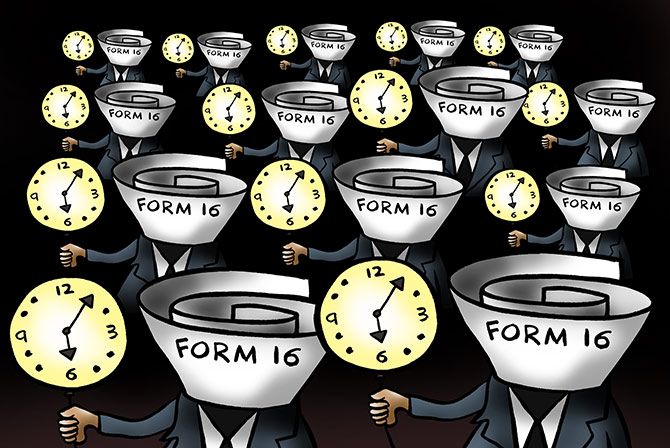'A gig economy is more suited for superior economic outcomes.'
'You try to create an environment where people can earn more.'
'This is what should happen in India. Indeed it is already happening,' says T C A Srinivasa-Raghavan.
Illustration: Uttam Ghosh/Rediff.com

Much fun has been made of Narendra D Modi's pakora statement. There's even talk of PMPRY -- Pradhan Mantri Pakora Rojgar Yojna. But this is all silly nonsense.
It's true that he chose a poor example, but the point he was making was a serious one, that of the distinction between self-employment and working for someone else.
For those of you who are so inclined it is the difference between Form 16 and Form 16A of the Income Tax.
So when economists try to gauge the success of the Modi government by looking at the number of jobs created -- and even that seems to be substantial according to some of them -- they are basically trying to gauge the volume of transportation in a modern city by measuring the amount of horse dung on the road when automobiles have become the new mode of transport.
Just as you don't examine a game of hockey or tennis by lamenting about the number of runs not scored or wickets not taken, economists should also wake up and see what game they are witnessing.
More specifically, in the case of employment, they are looking at old indicators. As a result, they are arriving at misleading and wrong conclusions about the economy that it is underperforming.
Opposition politicians are grasping at this and saying Mr Modi has provided a useless government. They forget that if they come to power, they will fare no better. Indeed, this is what Mr Modi has also discovered.
What has changed
Employment of the Form 16 type -- salaried where you sell your time for a fixed sum of money rather than your output -- was a 20th century aberration.
So were the political and now fashionable economic pre-occupation with things like income distribution, inequality etc.
It is these pre-occupations that exalted Form 16 on to a pedestal.
But the truth is that there was a political context to those things, which has now changed.
Form 16 employment has a simple objective: Smoothening the flow of income into an individual's hands, in weekly or monthly packets, spread over 35 or 40 years. It was seen as being essential for social stability.
This was not the case before 1917. After that, when the threat of Communism loomed large, this became the response demanded of capitalists by the political parties they supported.
Before the 20th century this threat of Communism was not there and the idea of employment as it came to be understood after 1917 simply did not exist as something governments had to aim for. That was something Keynes injected into politics a couple of decades later.
Then, in 1990, Communism as an ideology vanished. So now in the 21st century the 20th century idea of Form 16 employment is also going. Indeed, it almost has.
In the US they call this a gig economy.
But the truth is that a gig economy is more suited for superior economic -- if not political -- outcomes.
The target variable for governments moves from jobs to work, that is, from salaries to earnings.
You try to create an environment where people can earn more.
This is what should happen in India. Indeed it is already happening.
It is what Mr Modi was talking about in an idiom meant for his audience that day.
The benefits
Thanks to the 20th century way of looking at employment, people have forgotten that, from an economic point of view, what matters is the annual income of a family.
Income smoothening is the political counterpart.
A family may earn nothing for six months and yet have a huge annual income. Indeed, this is what happens in agriculture. Farmers earn whatever they do in four months in a year.
Professionals also don't have a fixed income flow, yet earn far more annually. These examples can be multiplied.
This happens because the market is flexible. And as we all know flexible markets are a sine qua non for greater productivity.
Form 16 employment merely transfers disguised unemployment into an office or factory.
What I find extraordinary is the very people who talk about increasing productivity also want sclerotic factor markets. But the fact remains: There is no difference between a non-performing asset and a permanent employee: Their yields are notional.
Government employees are a perfect case in point. And, by the way, in case you are wondering, I deliberately moved from Form 16 to 16A 21 years ago.
I chose to sell my output rather than my time.










